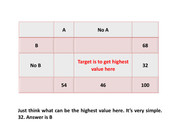
probability.
-
Md Raihan Uddin
- Senior | Next Rank: 100 Posts
- Posts: 49
- Joined: Sun May 18, 2014 8:51 am
-
Matt@VeritasPrep
- GMAT Instructor
- Posts: 2630
- Joined: Wed Sep 12, 2012 3:32 pm
- Location: East Bay all the way
- Thanked: 625 times
- Followed by:119 members
- GMAT Score:780
Think of it this way instead. The chances are .68 that B increases. If B increases, then there is a (.54/.68) chance that A increases. If B does NOT increase, then the chance that A increases is 0. (In your terms, P(B) = .68 and P(A|B) = .54/.68 and P(A|~B) = 0, so P(A) = .68*(.54/.68) + .68*0 = .54.)Mathsbuddy wrote: P(A which is dependent on B) = P(B and then A) = P(B independent) * P(A independent)
This gives you both probabilities in the original prompt, as well as a .32 chance that neither event occurs.



















